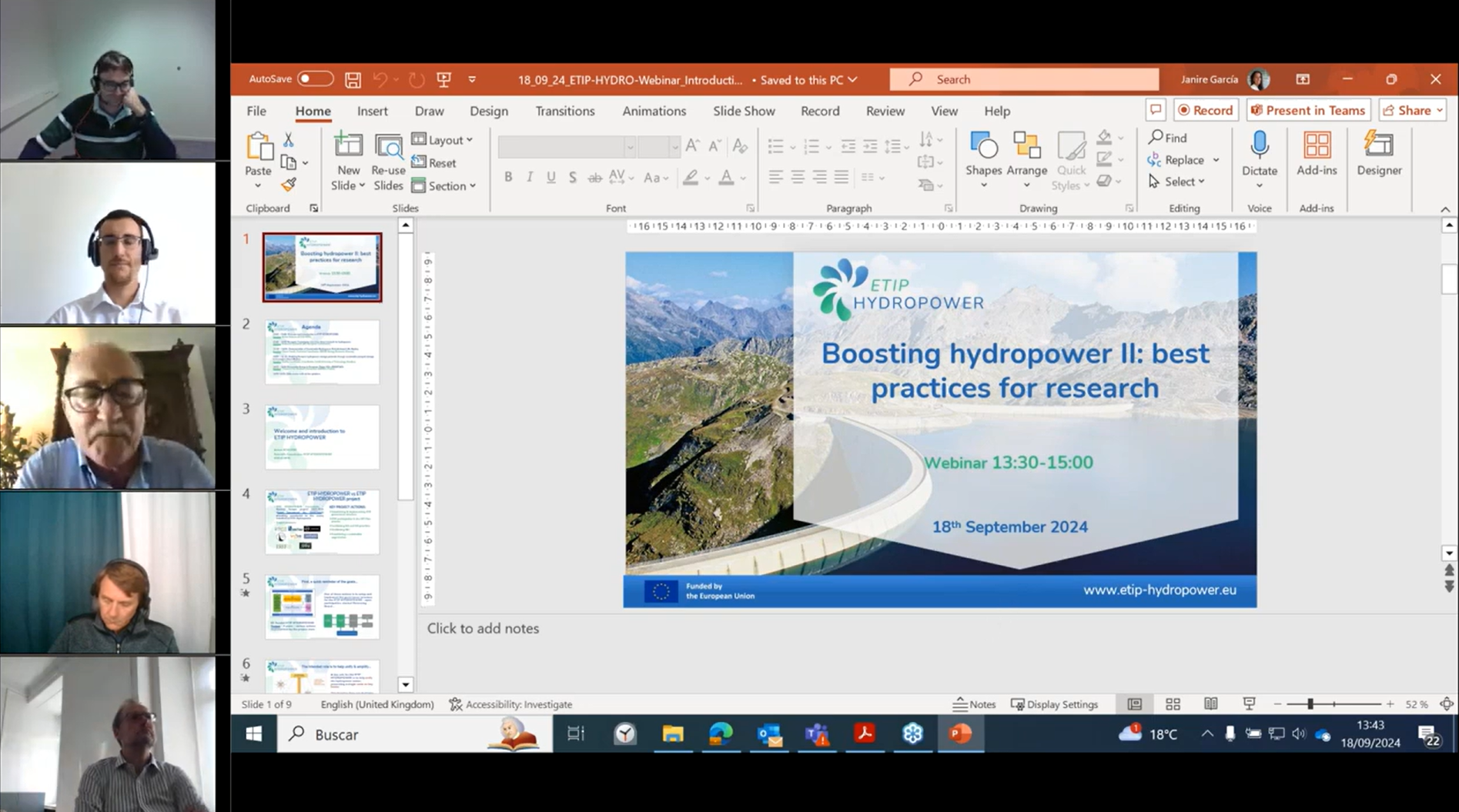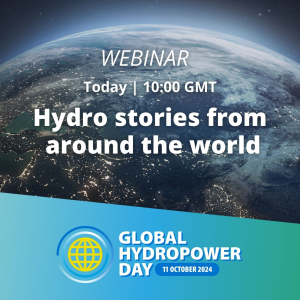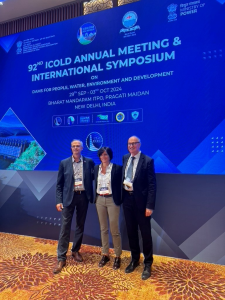UNIFYING THE VOICES OF HYDROPOWER
ETIP HYDROPOWER Highlights Role in Europe’s Sustainable Competitiveness at ENLIT 2024
Matteo Bianciotto, Senior Policy Manager at the International Hydropower Association (IHA) and part of the Secretariat for the ETIP HYDROPOWER project, participated as a speaker at ENLIT’s session titled “ETIPs as Catalysts for EU Sustainable Competitiveness.” The session focused on how European Technology and Innovation Platforms (ETIPs) can channel promising research and innovation (R&I) from academia and industry to the European Commission (EC) to strengthen Europe’s industrial and technological leadership.
The discussion highlighted the importance of identifying technologies that can be manufactured within the EU without relying on critical raw materials, thereby enhancing supply chain resilience, technological sovereignty, and Europe’s overall competitiveness. The session also explored strategies for optimizing ETIPs' role, including effective knowledge transfer, collaboration frameworks, and impact assessment methodologies. Insights were shared across key sectors like energy storage, wind, hydropower, photovoltaics (PV), and concentrated solar thermal (CST).
Key Points from Matteo Bianciotto’s Remarks:
Bianciotto emphasized hydropower’s unique role in Europe’s energy transition, presenting it as a sector of strategic importance:
- Europe as a Center of Excellence for Hydropower R&I: Europe is well-positioned to lead research and innovation in hydropower, supported by a robust supply chain based entirely within the EU. He stressed that Europe’s hydropower sector is not dependent on critical raw materials sourced from outside the EU, reinforcing its importance in promoting technological sovereignty.
- Hydropower’s Evolving Role: Hydropower’s traditional role as an energy producer is evolving, with increasing demand for flexibility services in the energy grid. This shift is driving innovation in digitalization, hybridization, and technologies like variable speed turbines and hydraulic short-circuit operations, along with river monitoring systems.
- ETIP HYDROPOWER’s Role: Bianciotto highlighted ETIP HYDROPOWER’s efforts to harmonize research across the sector, optimize resources, and ensure the widespread understanding and maximization of R&I benefits. The Research and Innovation Agenda (RIA) and Strategic Industry Roadmap (SIR) developed by ETIP HYDROPOWER serve as key tools guiding these efforts. The platform has fostered collaboration through thematic webinars, working groups, roundtables, and its annual ETIP HYDROPOWER Day.
- Opportunities in an Aging Fleet: He pointed out that Europe’s aging hydropower fleet presents both opportunities and challenges. With growing demand for storage capacity, new pumped-storage hydropower (PSH) projects and reservoir expansions are underway. These initiatives offer showcase opportunities for EU equipment suppliers, technology providers, consulting firms, and universities to demonstrate cutting-edge technologies.
- Balancing Clean Energy and Environmental Goals: Research and innovation in hydropower are addressing not only technical and operational challenges but also sustainability goals. Bianciotto stressed the need for the sector to balance its role in the clean energy transition with nature restoration targets.
- Remunerating Flexibility: One of the key challenges in unlocking hydropower’s full potential is ensuring that flexibility services are adequately remunerated. Bianciotto noted that this issue has been a focus for ETIP HYDROPOWER, as flexible hydropower plays a critical role in supporting the EU’s energy system.
The session, along with Bianciotto’s insights, underscored the critical role ETIPs like ETIP HYDROPOWER play in advancing Europe’s sustainable competitiveness and technological leadership, while contributing to the EU’s Green Deal and strategic autonomy.

ETIP Hydropower Secretariat Holds Annual Workshop in the Alps and Visits Jotty Hydropower PlantFrom October 7th to 9th, the ETIP Hydropower Secretariat held its annual meeting in the French Alps. The sessions aimed to discuss actions that highlight the importance of sustainable energy solutions and reinforce the role of hydropower in the energy transition. Members exchanged insights in a professional environment, focusing on the technical achievements and future direction of the project. During the meeting, ETIP members explored the next steps for the project, reviewed work packages, addressed challenges and opportunities for a financially sustainable ETIP, and define the architecture of the 2025 Hydropower Day. This annual event is scheduled to take place in Brussels on Tuesday, April 8, 2025. Save the date! The 2025 Hydro Day will focus on hydropower's contribution to energy transition, with three sessions planned:
The meeting not only offered the consortium an opportunity to convene, exchange ideas, and discuss the latest developments in hydropower, but also included a site visit to the historic Bioge-Jotty hydropower plant.
Photo 1: ETIP secretariat visiting the Bioge Hydropower Plant (Iraia Nuñez, Matteo Bianciotto, Federico Spadaro, Anton Schleiss, Janire Garcia, Andrej Misech, Mark Morris, Tasniem Jawaid, Lee William Estrellado, and Jean-Jacques Fry). The visit was managed by EDF, with a presentation of the hydropower scheme by Sebastien Girardier (Photo 2). The Jotty Hydropower Plant (Photo 3), located in the Haute-Savoie region of France, sits in the scenic Vallée d’Aulps, just above the renowned Gorges du Pont du Diable. The plant, which is situated on the Dranse de Morzine river, plays a significant role in the local energy infrastructure. It generates 98 million kWh of electricity annually using four turbines, powered by the Lac du Jotty reservoir—a 1.1 hm³, 1.5 km-long body of water formed by the Jotty arch dam.
Photo 2: The hydro scheme of La Bioge HPP Photo 3: The Jotty arch dam Courtesy Photo Yvan Tisseyre-OT Vallée d’Aulps During the visit, Samuel Hubert from Hydrostadium provided an introduction to the Jotty dam, which was constructed between 1946 and 1949. The arch dam stands 22.5 meters high and spans 120 meters in length. In 2015, the dam faced a major challenge when a flood with a 200-year return period eroded the banks, uprooted trees, and caused a dense blockage in front of the dam’s bottom gate and gallery (Photo 4). Restoring normal operations required several years of work and innovative solutions. A remote-controlled bulldozer was developed to remove the accumulated sediment, and divers were later brought in to complete the clearing of the conduit (Photo 5). This highlights the ongoing efforts required to maintain and preserve such critical infrastructure.
Photo 4: The bottom intake in empty reservoir (left) and the tree jamming (right) Photo 5: The bull dozer and its positioning controlled by computer |
ETIP HYDROPOWER second webinar in EU hydropower R&I projectsOn 18 September 2024, ETIP HYDROPOWER hosted the "Boosting Hydropower II: Best Practices for Research" webinar series, which provided updates on current developments in hydropower technology. The event, held from 1:30 PM to 3:00 PM CET, featured presentations on three EU research projects aimed at improving hydropower’s role in Europe’s energy system, with hundred attendees. Mauro Carolli from SINTEF Energy Research presented ReHydro, a project that focuses on the refurbishment and modernization of European hydropower systems. It aims to strengthen the role of hydropower in future power grids while addressing sustainability and climate change challenges. Staffan Lundström from Luleå University of Technology, Sweden, introduced Store2Hydro, a four-year project funded by the European Commission’s Horizon Europe programme. The project explores the integration of reversible pump turbine technology into existing hydropower plants to improve electricity storage capacity. Clement Van Straaten from ASKEUL presented the RENEWAT project, which focuses on repurposing water mills for renewable energy production. The project involves partners from six EU countries and aims to share knowledge and promote renewable energy initiatives in local communities. The session also included contributions from Emanuele Quaranta of the European Commission’s Joint Research Centre (JRC) and Anton Schleiss from the International Commission on Large Dams (ICOLD), who highlighted ETIP HYDROPOWER’s role in representing the hydropower sector. This webinar provided an overview of ongoing research efforts to enhance hydropower’s efficiency, sustainability, and integration into Europe’s energy systems. Stay tuned for the next webinar, which will take place on the 6th of December, presenting three new EU-funded projects in hydropower. For more information: Speaker slides: Anton Schleiss (ETIP HYDROPOWER), Emanuele Quaranta (JRC), Mauro Carolli (ReHydro), Staffan Lundström (Store2Hydro), Clement Van Straaten (RENEWAT) Webinar recording link here. #Hydropower #Sustainability #RenewableEnergy #EUFunding #EnergyTransition
|
Anton Schleiss at the Global Hydropower Day WebinarDuring the Global Hydropower Day, Professor Anton Schleiss, Coordinator of ETIP HYDROPOWER, participated in a webinar organised by the International Hydropower Association (IHA) that discussed the progress and challenges within the hydropower sector. The event brought together experts to share insights on sustainability, operational challenges, and workforce development in hydropower projects. Professor Schleiss presented ETIP HYDROPOWER’s work, focusing on its role in fostering innovation to meet Europe’s hydropower needs and its contribution to the sector's long-term sustainability goals, addressing how the project aim to support the doubling of hydropower capacity by 2050 to meet global net-zero objectives. The webinar also featured discussions on overcoming technical and environmental challenges in hydropower development. Case studies from various regions provided examples of obstacles hydropower projects have encountered, alongside lessons learned that are shaping future development strategies.
|
ETIP HYDROPOWER Leadership Participates in ICOLD Annual Meeting and Symposium in New DelhiLast week, members of the ETIP HYDROPOWER Secretariat and Governing Board played a key role at the ICOLD Annual Meeting and Symposium held in New Delhi, India. The event brought together global experts to discuss advancements in dam engineering, climate change, and hydropower. Representing ETIP HYDROPOWER were:
During the event, participants discussed the preparation of a World Declaration on the role of dams and reservoirs in supporting the energy transition and adaptation to climate change. This important declaration will be developed in collaboration with other organizations to highlight the significance of hydropower infrastructure in the global shift to renewable energy and climate resilience. The involvement of ETIP HYDROPOWER in these discussions underscores the organization's commitment to promoting sustainable hydropower solutions and addressing the challenges posed by climate change.
|










